- Home
- Mark Chadbourn
Always Forever taom-3
Always Forever taom-3 Read online
Always Forever
( The Age of Misrule - 3 )
Mark Chadbourn
Mark Chadbourn
Always Forever
We're a cynical race. With remarkable ease we manage to find the worst in everyone we meet. Charity workers selflessly slave amongst the poor in a disease-ridden quarter of some stinking tropical city. They get spotted kicking a dog or yelling at some unfortunate on a bad day that has somehow surpassed all the other bad days and instantly we're tearing them apart for being less than worthy. Where does that come from? Is it some kind of repressive religious thing slammed into us during schooling, where everyone is a sinner unless they're a saint? Look around-the world out there is a nightmare; the same as before, I suppose, only different. It's a struggle for anyone to get through it, but we carry on, trying to do the best we can under the circumstances. We're all deeply flawed-that's our nature. But if we fight to overcome those flaws, surely that's worth some praise, isn't it? The only time to make any judgment-and maybe not even then-is at the end of someone's life, when you can stand and look back, weighing all the good things and the bad things and the overwhelming majority of thoroughly mundane things, and decide whether it was a life well lived. Let me tell you now, you won't find many saints. I bet you won't find any at all. But you will find a preponderance of fundamentally good people striving to be the best they can. And isn't that the kind of thing we should be celebrating: not that someone is good, but that they're fighting to be better.
So let's talk about heroes.
The worst always brings out the best in people when they're pushed to the edge and find reserves they never realized existed in their day-to-day lives. And these are, indeed, the worst of times, so it's hardly surprising that in the midst of them we found the best of heroes. Just normal folk, like you and me, with the usual bundle of neuroses and weaknesses, but they've proved themselves to be champions. (Excuse the gushing language: it's not modern, and it's not British, and it's not cynical. But then, that's the point I'm making.) I'm writing this so the record of their deeds is preserved to inspire future generations. Is that a pretentious hope? I don't know, but it's important to me that I do it.
If you'd met them on the street in the time before the Big Change, you probably wouldn't have given them the time of day. Jack Churchill, Church to his friends, was moody and introspective, driven to the edge of despair by the suicide of his girlfriend, Marianne, two years earlier. That act had thrown his entire life off course. He'd been an archaeologist and a writer with massive potential, but he ended up going nowhere, losing his friends, his hope. Ruth Gallagher was a lawyer for some big-shot firm-sharply intelligent, as you would expect, but a little repressed, with a problem finding any relationship to match her exacting standards. Although she'd achieved a great deal for someone in her late twenties, she didn't feel fulfilled. She'd only taken on her career to please her beloved father, who'd died of a heart attack after learning his brother had been murdered in a bungled building society robbery. Laura DuSantiago was probably the most complex and misunderstood of all of them. By all counts, she was a sociopath and misanthrope with a past blighted by drugs and petty crime. Her acid tongue and sarcastic manner made it almost impossible to like her. At the same time she was brilliant with technology, and once you broke through the unpleasant exterior you found reasons for her attitude and the constant confusion that obscured her true nature: as a child she'd been to hell and back at the hands of a mother who used religious obsession to mask her growing psychoses; Laura's body and mind were left scarred in the process. And in a struggle with her mother in the family home she had woken from unconsciousness to find her mother dead, seemingly by Laura's hand.
Shavi-no one ever found out his full name-was certainly the most well balanced of the five. An Asian who grew up in a strictly Muslim family, he was eventually cut off by his father when he refused to accept his religion and traditional ways. A lifetime of searching followed, during which Shavi dabbled in every religion and explored every occult and New Age byway. It left him a deeply philosophical and spiritual man, and the solid moral core of the group. He was a neo-hippie, enjoying his mind-expanding drugs, espousing free love with men or women. Like the others, however, there was a darkness in his life. As he left a London gay club with his boyfriend, Lee, he was attacked by someone he couldn't identify in the dark. Lee was brutally murdered.
And then there was Ryan Veitch, a hard-bodied, hard-minded thug who grew up in a South London family of petty criminals. His childhood had been troubled by vivid dreams that he'd only been able to exorcise by having their images tattooed on his body. His mother died when he was young, leaving him and his brothers to make up for a father so traumatized by his wife's death he was unable to keep a job and barely able to hold the family together. It was hardly surprising that he viewed crime as the only option to survive. But then the young Witches made the mistake of bungling a building society robbery. In the confusion Ryan fired his shotgun and an innocent man died-Ruth's uncle, one of the many coincidences that are thrown up in this new age. But, as we all know, there are no coincidences. Growing up under different circumstances, Ryan might have been a very different person. He showed great remorse for the murder, and from then on, every waking moment was spent trying to make up for his crimes, "to do the right thing" as he constantly told everyone. More than any of them he wanted to be a hero, to get the girl, the acclaim. To be good.
But that was their lives before. In the cauldron of hardship that came after the world changed they all found what their true characters really were. And in a way, that underlines the subtext of what I'm saying here: you should never judge a book by its cover, and although that's a bit of a cliche, it serves a point. You can't trust your perception at all; there's always something going on behind the scenes. So if you can't trust what you see, hear, smell, touch, taste, what should you do? Trust your heart, I say. Trust your heart. But I'm getting beyond myself…
It started one cold, misty night beneath Albert Bridge on the banks of the Thames. Church and Ruth came across what at first sight was a mugging: a minor Ministry of Defence official, Maurice Gibbons, was being attacked by a giant of a man. Then the attacker's face appeared to melt. It changed into something monstrous, and Church and Ruth both blacked out at the sight. The incident turned their world on its head, though we all know what the creature was now-one of the unbelievably ancient race of shape-shifters that passed into Celtic myth as the misshapen, demonic Fomorii, things so alien to us our brain can barely give form to the signals it receives whenever we see them. Our mind fakes up the image the best it can, or it simply shuts down and buries the hideous experience in the subconscious, where it gnaws away like a maggot. Church and Ruth were so troubled by this process they were forced to delve into it further, eventually ending up at the studio of Kraicow, an artist who had seen the same kind of thing. He confirmed their worst suspicions.
The shock drove them on the road in search of Laura, whom Church had come across on the Internet and who seemed to have information which might help them; this was after Church glimpsed the ghost of Marianne outside the flat they used to share.
The Fomorii were on their tails immediately. The two of them were saved from certain death by Tom, on the surface a burnt-out hippie. It's hard to believe, but he was actually the mythic figure Thomas the Rhymer, hundreds of years old, gifted with the curse of second sight and The Tongue That Cannot Lie. The old stories said he was taken into the Land of Faerie, where time passes differently from here, by the Queen of Elfland. And like all the old stories, it captured the essence, if not the whole truth. He did spend time in that strange place, certainly, but no human could have come close to describing the extent of his experiences the
re. It was, by all accounts, a time of both pleasure and pain. He was "taken apart and rebuilt," suffering so incredibly his mind was scarred. It gave him his strange powers but left him completely detached from humanity; the loneliest man in the world, of neither here nor there.
While traveling west, the three companions were attacked by a flying, firebreathing serpentine creature from the storybooks. This Fabulous Beast drove them to take refuge at Stonehenge, where that site's particular powers made them invisible to its attentions. And it was there Tom told them what was at first an unbelievable tale: of how myths and legends are the secret history of the world. Every creature that ever slithered through our dreams and nightmares into old stories actually existed, though perhaps not in forms we knew. And he told the oldest story of all, one that has become preserved in every culture: of a tremendous war between two opposing powers-the Fomorii, known as the Night Walkers, a force of entropy determined to drive all existence into darkness and chaos, and the Golden Ones, known by the Celts as the Tuatha De Danann, as hypnotically beautiful as the Fomorii were monstrous. Angels and demons, if you will. But the Tuatha lle Danann were as alien to us as the Fomorii-unpredictable, unknowable, beyond all concepts of good and evil, and therefore just as dangerous.
The struggle between the Golden Ones and the Night Walkers almost devastated the world in antiquity, but at what the Celts called the second battle of Magh Tuireadh, the Fomorii were defeated. The postwar deal meant both sides vacated this planet for that strange place where the laws of physics don't seem to work-Faerie, Otherwords, T'ir n'a n'Og, Heaven and Hell, whatever name you prefer-and they took with them almost all the other creatures of myth. The deal was that they would never return. But some of them managed to sneak back for brief visits through the liminal zones, the lakes, the hilltops, the stone circles, where the division between our two worlds were thinnest, explaining all our history of supernatural phenomena from ghosts to UFOs to lake monsters.
The deal held reasonably well for millennia, until, through some process no one quite understands, the Fomorii broke through once again. They unleashed a tremendous force, the Wish-Hex, which trapped some members of the Tuatha lle Danann in exile and brought some under Fomorii control; only a handful escaped.
But our own world was not without its own defences. Running through everything is a strange energy that manifests itself as a blue fire. The Chinese know it as chi; other cultures call it something different, but every race has an under standing of it. It's the lifeblood of the planet, the lifeblood of us, an overpowering spiritual force that heals and uplifts. The Fiery Network is in everything, but it is most evident at certain potent sites which have become sacred down the yearsthe places where our ancestors erected stone circles, or our greatest cathedrals. Over the years we lost touch with this force, and became the worse for it. In all but the most powerful places it grew dormant. The Fabulous Beasts, as the ancient Chinese knew, were both symbolic of the earth energy and guardians of it, following the lines across the land, living on the energy it gave off. These remarkable creatures had awakened with the return of the Fomorii, but the one which attacked Church, Ruth, and Tom had fallen, briefly, under the power of the Fomorii; it was too powerfully independent to be controlled for long, though.
And, too, there were human avatars of the Blue Fire, the Brothers and Sisters of Dragons, humans within whom the spiritual force burned most brightly. In ancient times they helped defend the world, and now, Tom said, they had been resurrected. There would be five in total, and Church and Ruth were two of them. The five were found by the Blue Fire and it was up to them to defend the world, however reluctant they felt about this task. But their job wasn't just defence; there was another side to it too. Prophecies linked to the old Arthurian legends spoke of a king awaking in Britain's darkest hour to save the land. Like so many other aspects of myth, this was a metaphor. The king was the spiritual force in the land and it was up to the Brothers and Sisters of Dragons to wake it from its slumber. Those tales of King Arthur actually proved a secret guide; sites linked to Arthur were places potent in the spirit power. The stories themselves told in their complex code how the earth energy and its champions defended the land and how it fell into dormancy, waiting to be called back again at a time of greatest need.
Understandably, Church and Ruth found it difficult to assimilate all this new information, especially when it went against the way they had been taught to see the world since childhood. But how could they deny the evidence of their eyes?
As they slept in Stonehenge that night, Church was visited by the spirit of Marianne once again, and this time she left him a gift: an unusual black rose, the Roisin Dubh. He took it, not realizing what it meant.
In Salisbury they encountered Laura for the first time. But they were also pursued by frightening aspects of the supernatural: the demonic black dog, Old Shuck, which acts as precursor to the Wild Hunt of legend, fabled for hunting down lost souls, as well as the Baobhan Sith, ghostly, bloodsucking creatures of the night. And Ruth had her first encounter with the goddess who would eventually become her patron, the mysterious triple nature deity that manifested as maiden, mother, and crone.
They also had what would prove to be a fateful encounter with a strange wanderer who called himself Callow. On first impression, he seemed merely eccentric, speaking in a theatrical manner, constantly trying to wheedle free drinks and food; harmless enough.
Laura took Church, Ruth, and Tom to a depot on an industrial estate where she had had a life-changing experience. The place looked mundane, but the depot was being run by the shape-shifting Fomorii for distribution of canisters filled with a foul black gunk. Church and Laura plunged through a hole in the air, finding themselves in the Watchtower, a structure suspended in space and time, somewhere between our world and the Otherworld. Here Church experienced several troubling, prophetic visions before encountering Niamh, one of the Tuatha lle Danann who had escaped the Fomorii's Wish-Hex. Beautiful and enigmatic, Church felt he knew her instantly, which in a way he did. She had been visiting him at night throughout his childhood, preparing him for his role as a Brother of Dragons, although he had always thought her a dream. She told him everything about the Tuatha lle Danann and what was expected of him: to find four mystical objects of power hidden for aeons. They were the sword, spear, stone, and cauldron-or Grail-which had played such a part in all our legends, and they were the only things that could free the exiled Tuatha lle Danann. And they were the only ones who could repel the Fomorii; humanity stood no chance alone, she said. She gave him the Wayfinder, a magic lantern with a flame of the Blue Fire that would point him in the direction of the artifacts.
Church and Laura returned to Earth, only to find the depot in flames and Tom disappeared. They picked up Ruth and headed to the first location: Avebury. There they met the strange, old man known only as the Bone Inspector. He was caretaker of the country's ancient sites and the last in a very long line of wise men driven underground at the time of the Roman invasion. He led them beneath the stone circle to the main source of the Blue Fire in the south, and the home of the oldest Fabulous Beast. There Laura reclaimed the first of the artifacts, the Stone of Fal, rumoured to be able to recognize the true king of the land; it screamed when Church touched it, the first sign of his destiny.
Leaving the Bone Inspector behind, they headed east. They were halted by the inexplicable failures of technology that had been happening randomly since the change came over the world, stranded with their useless car just outside Bristol. After making camp, Church encountered a young girl named Marianne who gave him a cheap locket containing a picture of Princess Diana. Church felt a connection to the bright, optimistic child, not in the least because her name was the same as his dead girlfriend.
That night Ruth encountered the goddess again, who asked Ruth to look for the missing other half of the nature deity. Ruth fled in terror, but not before the goddess gifted her a familiar in the form of an owl.
The next day they were forc
ed to rush the now-comatose Marianne to hospital. She had been living for months with a blood clot close to her brain. Before, it had been too dangerous to operate, but now only a touch-and-go op could save her. Not long after she went into the theatre, another technology failure struck and the hospital was plunged into darkness and chaos.
But then a remarkable thing happened. Somehow Marianne made her way from the operating theatre to cure an entire cancer ward with some power from within her. It manifested as a brilliant white luminescence, like a lightbulb burning itself out. She died immediately afterwards. It was almost as if she had wanted to commit some last act of goodness before moving on. This affected Church deeply. It showed that the change wasn't all bad; miraculous, wonderful things could happen too. He kept her locket as a reminder of that day.
They followed the lantern south until they came to an inn in the centre of Dartmoor where they planned to stay the night. But as they rested, the terrible, otherworldly Wild Hunt attacked. This shadowy troupe on horseback was led by the goblin-like Erl-King and was accompanied by a pack of devilish hounds. Many people at the inn were slaughtered by the Hunt's cruel weapons. Church fled across Dartmoor on a motorbike to try to draw the Hunt away, while Ruth and Laura drove off in the opposite direction, but Church hadn't gone far before he plunged into one of the abandoned mineshafts that dot the moor.
Not long after, Ruth and Laura encountered Shavi for the first time, and the three of them embarked on a desperate race across the countryside, with the Hunt in hot pursuit. They escaped only with the coming of the dawn, eventually winding up in Glastonbury.
Meanwhile, Church found himself imprisoned in a Fomorii den, deep beneath Dartmoor. His cellmate was Ryan Veitch, who had been captured earlier, and soon Tom was brought into the cells too; he had suffered greatly at the hands of the Fomorii since his capture in Salisbury. It wasn't long before Church met Calatin, the Fomorii half-breed and leader of one of the main factions, or tribes, in the Fomorii hierarchy. If you can attribute any human abstract to the Fomorii, it would be Evil, but Calatin was worse than the others, somehow. Perhaps it was just the fact he looked less twisted on the surface, so that whatever lay beneath was amplified. He put Church through appalling torture in search of information, but Church gave nothing away.

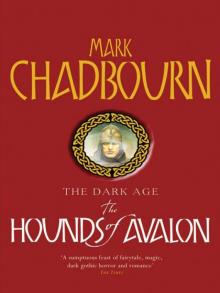 The Hounds of Avalon tda-3
The Hounds of Avalon tda-3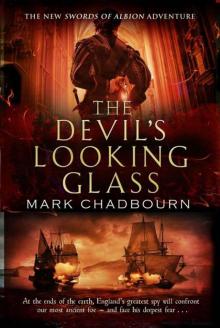 The Devil's Looking-Glass soa-3
The Devil's Looking-Glass soa-3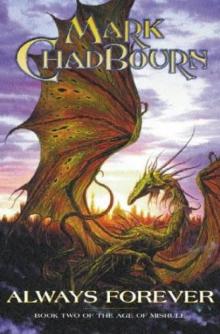 Always Forever taom-3
Always Forever taom-3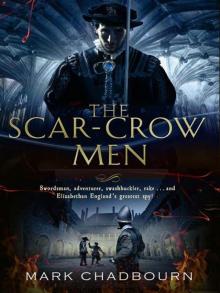 The Scar-Crow Men
The Scar-Crow Men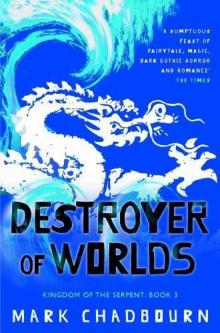 Destroyer of Worlds kots-3
Destroyer of Worlds kots-3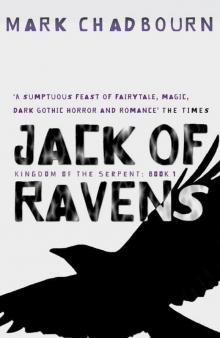 Jack of Ravens kots-1
Jack of Ravens kots-1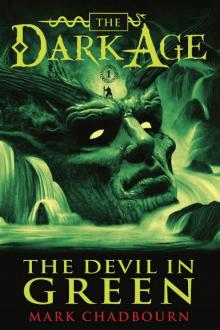 The Devil in Green
The Devil in Green World's End
World's End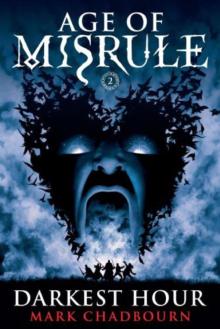 Darkest Hour (Age of Misrule, Book 2)
Darkest Hour (Age of Misrule, Book 2) Destroyer of Worlds
Destroyer of Worlds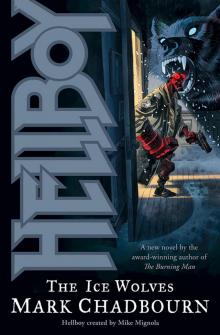 The Ice Wolves
The Ice Wolves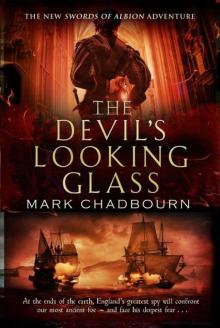 The Devil soa-3
The Devil soa-3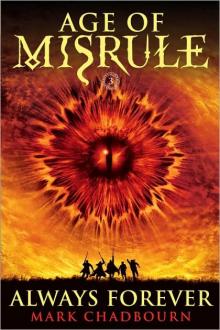 Always Forever
Always Forever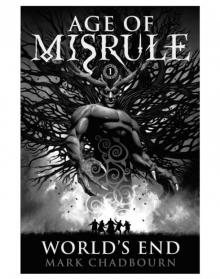 World's End (Age of Misrule, Book 1)
World's End (Age of Misrule, Book 1)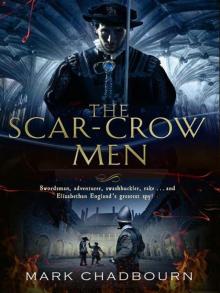 The Scar-Crow Men soa-2
The Scar-Crow Men soa-2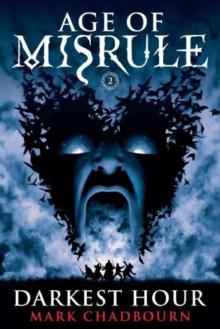 Darkest hour aom-2
Darkest hour aom-2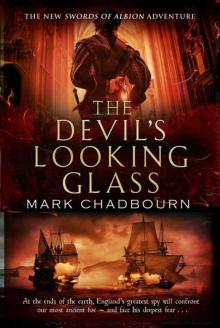 The Devil's Looking-Glass
The Devil's Looking-Glass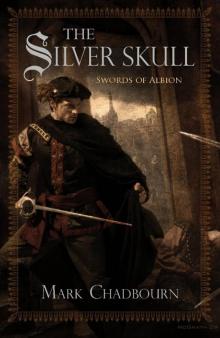 The Silver Skull
The Silver Skull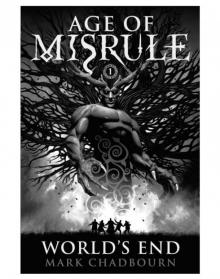 World's end taom-1
World's end taom-1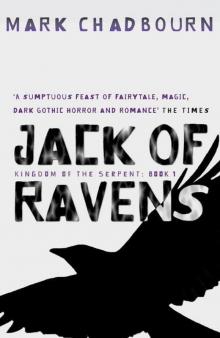 Jack of Ravens
Jack of Ravens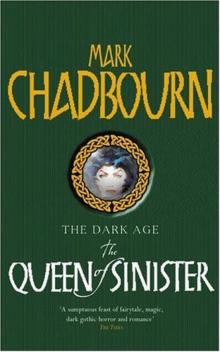 The Queen of Sinister
The Queen of Sinister